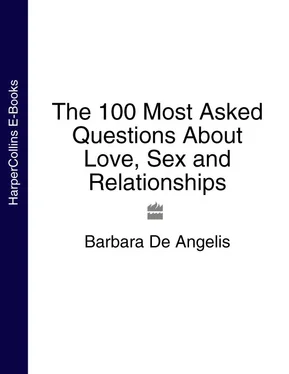Why are you asking me this question? You already know the answer. You can’t marry someone who is emotionally married to one or both of his parents. You can’t marry someone who hasn’t grown up. Well, actually, you can marry someone like that, but you’ll be miserable. You have every classic sign of coming face to face with what I call “Toxic In-Laws.” Toxic in-laws do not respect the boundaries of your relationship and the boundaries between them and your spouse. They will interfere in your life, become time and energy vampires, and even refuse to acknowledge you or your relationship, because to them, you are an outsider. They haven’t let go of their son and will resent you for taking him away from them.
Do these things sound bad? Well, there’s nothing compared to how toxic in-laws will drive a wedge between you and your partner by creating dissension in your relationship. It sounds like that’s already happening with you and your fiancé. You end up feeling unsupported and misunderstood by him, furious at his parents for manipulating him, and everyone starts thinking you’re a real bitch! And if you think it’s bad now, wait until you have children!!
In spite of what you may believe, your fiancé’s parents aren’t the problem—he is.If he took a stand with his parents and set boundaries in their relationship, it wouldn’t make any difference how much they tried to interfere. He needs to make you number one in his life. You need to be his first priority; your marriage has to come first before his relationship with his mother and father.
The children of toxic in-laws need to communicate the following information to their parents if they want to save their relationships with their partners:
1. I have chosen my spouse to be my lifelong mate, and I expect you to treat her (him) with total respect, courtesy, and warmth. We are a couple, and when you criticize or hurt my partner, it is the same as hurting me.
2. If you cannot bring yourself to behave with respect around my spouse, then I do not wish to see you. You will either see us together and treat us with love, or not see us at all.
3. My home is mine, not yours. When you come over, you will call first, and if we want to see you, we will tell you. When you do come over you will not tell me or my wife how to run our lives, raise our children, arrange our furniture, etc.
4. You need to respect our time and privacy. That means I do not wish you to call my house five times a day. Give us the space to want to call you. Naturally I will be here for you if there is a real emergency.
5. I know this may be difficult for you to understand, but that’s the way it is. I want you in my life, but not if you cannot accept my marriage and respect our relationship.
If you discuss this with your partner, and he repeatedly refuses to confront his parents, you can try suggesting counseling so he can get a third opinion. If he refuses that, you need to ask yourself why you are staying in this relationship. It isn’t going to get any better, and you know it’s already tearing you apart. Do not get married unless this is resolved!!
21 Why do I always fall in love with people who need rescuing?
I’m presently dating a woman who’s basically a mess. She has major financial and emotional problems, and I spend a lot of my time playing “Daddy,” trying to help her. I can’t believe I’m in this kind of relationship again—it’s the third time in a row I’ve gotten involved with “victim-type” women. Why am I doing this, and how do I stop?
Why are you doing this? Because you like rescuing women … you like feeling strong, important, superior … you like being in control. Rescueholics are drawn to wounded, fragile, unloved partners like flies to honey. These relationships suck you in, and once you’re in, boy is it hard to get out!! The good news is that you’ve finally recognized the pattern, and sound desperate enough to change it.
Remember—in all codependent relationships, the rescuer needs the victim as much as the victim needs the rescuer. If you are an “emotional Robin Hood,” always finding partners in need of your help, you may in fact be completing unfinished business from childhood, acting out your little boy’s unfulfilled need to fix or rescue Mom, Dad, or another family member. Or maybe you’re attempting to rescue yourself as you felt when you were small. The problem is that like all rescuers, you are mistaking sympathy for love.
You already know from experience that this sort of relationship is doomed. You end up acting like a parent, tiptoeing around your partner in order to not upset her, and making excuses for her behavior. Ultimately, your resentment grows and although you want to leave, you feel trapped, too guilty to leave and hurt even more this poor wounded person you wanted to heal. When you do inevitably leave, you feel like you’re abandoning your lover, and beat yourself up for “failing.” Sounds like lots of fun …
You asked me how you could stop. My answer: Just stop.End this relationship before it gets any worse; encourage your girlfriend to get help dealing with her need to be rescued, and take some time to look at your own issues and needs that have addicted you to this kind of unhealthy love pattern. Make a list of all the qualities you want in a woman; make a second list of all the warning signs that someone is a potential “victim-type” mate. Read these lists constantly. Put copies everywhere. When you go out on a date with a new woman, read the lists before, during, and after the date if you have to. This will help you resist the temptation to get involved with another rescue job again while you’re healing on the inside.
22 Can a big age difference between two people hurt the relationship?
I’m in love with a great guy who happens to be twenty-two years older than I am—I’m thirty-one and he’s fifty-three. He’s been married and divorced and has children not much younger than me. My family thinks I’m making a big mistake, and have come right out and told me that they don’t approve of the relationship. Am I being naive to think our age differences don’t matter?
 Yes, you’re naive if you think your age differences don’t matter. They do, but so do all the other differences in your circumstances and personalities. So ignoring this issue, or any issue, won’t work. The more you insist that there aren’t any problems, the more you are probably suppressing your concerns for fear that they will sabotage the relationship. Both you and your partner need to honestly and directly face and discuss all the various problems that have or could emerge around your age difference.
Yes, you’re naive if you think your age differences don’t matter. They do, but so do all the other differences in your circumstances and personalities. So ignoring this issue, or any issue, won’t work. The more you insist that there aren’t any problems, the more you are probably suppressing your concerns for fear that they will sabotage the relationship. Both you and your partner need to honestly and directly face and discuss all the various problems that have or could emerge around your age difference.
Significant age differences between partners can cause serious problems in relationships. The word “significant” is important here: If your partner is four or five years older or younger, it won’t make much of a difference. However, if your partner is ten or more years older or younger than you, it can cause difficulties depending on your ages and other aspects of your personalities. I’ve found that age differences mean less as both partners get older. For instance, a fifteen-year age difference between a thirty-five-year-old man and a twenty-year-old woman will probably create more potential hazards than that age span in a sixty-fiveyear-old man and a fifty-year-old woman. The age difference will affect the first couple more, since their maturity and experience levels are usually much more dissimilar than the second couple’s.
Читать дальше

 Yes, you’re naive if you think your age differences don’t matter. They do, but so do all the other differences in your circumstances and personalities. So ignoring this issue, or any issue, won’t work. The more you insist that there aren’t any problems, the more you are probably suppressing your concerns for fear that they will sabotage the relationship. Both you and your partner need to honestly and directly face and discuss all the various problems that have or could emerge around your age difference.
Yes, you’re naive if you think your age differences don’t matter. They do, but so do all the other differences in your circumstances and personalities. So ignoring this issue, or any issue, won’t work. The more you insist that there aren’t any problems, the more you are probably suppressing your concerns for fear that they will sabotage the relationship. Both you and your partner need to honestly and directly face and discuss all the various problems that have or could emerge around your age difference.










